|
|
|
Sort Order |
|
|
|
Items / Page
|
|
|
|
|
|
|
| Srl | Item |
| 1 |
ID:
115037
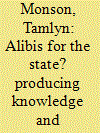

|
|
|
|
|
| Publication |
2012.
|
| Summary/Abstract |
This paper examines the production of knowledge about the causes of the May 2008 attacks on foreign nationals in South Africa, embodied in state actors' recourse to discursive tropes of a 'third force' or mere 'criminality' in explaining the attacks. It explores the way in which this 'knowledge' reproduced statist notions of territory and power in the wake of a cataclysm that destabilised conventional notions of the congruence of nation, state and territory. The paper shows how official explanations of the attacks served both to camouflage the internal borders made visible by localised conflagrations and to reassert the state as the exclusive author of territorial borders.
|
|
|
|
|
|
|
|
|
|
|
|
|
|
|
|
| 2 |
ID:
110087
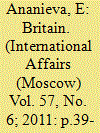

|
|
|
|
|
| Publication |
2011.
|
| Summary/Abstract |
BROKEN GLASS has been already removed but the August riots in Britain left a "broken society" behind them: an emergency session of the Commons; a prime minister promising to track down and to punish wrongdoers; the leader of the opposition pledging to stand shoulder to shoulder with him. It was as if the country was at war.1
Politicians and analysts tried to go to the roots, to identify the causes and suggest remedies: there was no shortage of explanations ranging from "rap music which glorifies violence and loathing of authority" to "no father at home" to get from him "a positive sense of masculinity," and the mortgage crisis.
|
|
|
|
|
|
|
|
|
|
|
|
|
|
|
|
| 3 |
ID:
101286
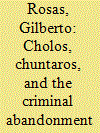

|
|
|
|
|
| Publication |
2010.
|
| Summary/Abstract |
By advancing what I am calling the new frontier of the United States and Mexico as central in the formation of subjectivities, this article foregrounds two contemporary figures: 'cholos' and the 'chuacutentaros.' The former is how a particular group of youths, who called themselves Barrio Libre or the Free 'Hood, self-identified and the term is often common shorthand for 'gang' in much of the Americas. The term speaks to the premiere figure of an anxiety about unchecked, undocumented, and criminalized racial and cultural flows in the Americas. The cholos of Barrio Libre preyed on 'chuacutentaros,' the provincial 'hick' of an increasingly urbanizing, migrating Mexico. 'Chuacutentaros' has also become a term for the alien bodies that pass through daily projects of state sovereignty at the margins of two states, specifically United States and Mexican intensifying militarized policings and their dramatic abandonments. In this article, I situate these practices within the history of largely unacknowledged racisms in Mexico, tied to projects of mestizaje.
|
|
|
|
|
|
|
|
|
|
|
|
|
|
|
|
| 4 |
ID:
125360
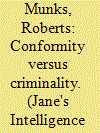

|
|
|
|
|
| Publication |
2013.
|
| Summary/Abstract |
The Colombian government and the insurgent FARC appear to be inching slowly towards a peace deal. Robert Munks assesses how the temptations of criminality and modalities of demobilization would be likely to act upon a post conflict FARC.
|
|
|
|
|
|
|
|
|
|
|
|
|
|
|
|
| 5 |
ID:
129607
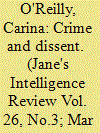

|
|
|
| 6 |
ID:
190796
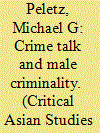

|
|
|
|
|
| Summary/Abstract |
In the past few decades many countries have experienced a surge in crime that is heavily gendered. Men are responsible for much of the rising tide of criminality (and for most criminal offenses prior to the recent surge). This dynamic threatens not only women and children but also societies and polities more generally. Additionally, it occasions serious doubts about state agents’ widely touted commitments to law and order and their oft-celebrated claims to prioritize the safety, flourishing, and overall well-being of law-abiding citizens. It is thus paradoxical that mainstream public debates on illegalities and delinquencies oftentimes do not substantively engage the strongly gendered nature of criminal transgression. This article explores such paradoxes by providing interdisciplinary perspectives on the Muslim-majority nation of Malaysia. It draws on nearly three years of ethnographic fieldwork and historical research, supplemented by analysis of court records, media accounts, and other sources, to argue that essentialized categories and conceptual dichotomies in the dominant public narratives on crime contribute to the relative elision of gender in discussions of criminality. The article also addresses the socio-political significance of these dynamics and some of their comparative and theoretical implications.
|
|
|
|
|
|
|
|
|
|
|
|
|
|
|
|
| 7 |
ID:
083120
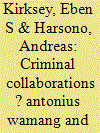

|
|
|
|
|
| Publication |
2008.
|
| Summary/Abstract |
US intelligence reports linked the Indonesian military to the August 2002 murder of two American schoolteachers and an Indonesian in Timika, Papua province. Restrictions on the US Foreign Military Financing (FMF) and International Military Education and Training (IMET) for Indonesia came to be linked to the investigation of this murder. However, a Jakarta court subsequently sentenced a Papuan villager, Antonius Wamang, to life in prison for leading the attack. Six other villagers were given sentences ranging from five to eight years. The same day that Wamang was sentenced, Pentagon officials announced a 'new era of military cooperation' with Indonesia. Yet many irregularities were not resolved during the trial. Questions remain about whether Wamang's group acted alone. Did Indonesian military agents help Wamang stage the attack? Did Bush Administration officials help cover up evidence of Indonesian military involvement so that they could pursue objectives in the war on terror? The idiom of co-production offers insight into ambivalent and contingent collaborations that develop during covert operations and acts of terrorism.
|
|
|
|
|
|
|
|
|
|
|
|
|
|
|
|
| 8 |
ID:
159868
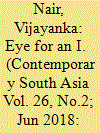

|
|
|
|
|
| Summary/Abstract |
In 2009, the Government of India embarked on a mission to issue each of India’s over one billion residents a unique biometric identification number, Aadhaar (literally, ‘foundation’). An Aadhaar database would link the demographic and biometric information (iris scans, fingerprints, facial photograph) of residents to a 12-digit number. India currently commands the world’s largest biometric database. While Aadhaar does not guarantee citizenship, benefits, or services, its architects submit that its reliable, real-time identity verification infrastructure potentially allows for the targeted delivery of any good to its intended recipient. Aadhaar is fashioned as an ID concerned with a pristine bodily uniqueness untarnished by the social, political, or economic. Aadhaar frequently provokes the questions: Who is the recipient of Aadhaar and to what community does Aadhaar afford membership? Based on ethnographic fieldwork in India’s capital, New Delhi, this article examines how Aadhaar comes to inform ideas of identity and belonging held by its implementers, as well as the population it targets.
|
|
|
|
|
|
|
|
|
|
|
|
|
|
|
|
| 9 |
ID:
152961
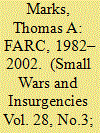

|
|
|
|
|
| Summary/Abstract |
Recent controversy during the conclusion of peace talks has renewed discussion as to the nature of the effort by Fuerzas Armadas Revolucionarias de Colombia, or FARC (Revolutionary Armed Forces of Colombia), to seize state power. FARC presents itself as an insurgency produced by societal imperfections and purports to speak for the marginalized and alienated of Colombia. Critics contend that FARC is a ruthless narcoterrorist organization that has targeted the people. In fact, FARC comes closer to the latter than the former, because its critical decision to privilege criminality for generation of means destroyed execution of a viable people’s war strategy. Ultimately, means devoured ways in such manner as to make ends unachievable. Criminality, though it made FARC perhaps the richest insurgent group in the world during its heyday, laid the foundation for its defeat by ceding legitimacy, and thus mass mobilization, to the democratic state.
|
|
|
|
|
|
|
|
|
|
|
|
|
|
|
|
| 10 |
ID:
160221
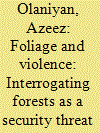

|
|
|
|
|
| Summary/Abstract |
The discourse on security challenges in Nigeria has generated much scholarly insight. What is yet to be sufficiently interrogated is the place of forests in the problem. Situating the problem within the context of global occurrences, the study explores security threats posed by the poor management of some Nigerian forests, which has resulted in invasion and exploitation by criminals who engage in militancy, kidnapping, ritual killing, armed robbery, cattle rustling and cannabis cultivation. Using the theory of ungoverned spaces as a foundation, the study locates the major reason for the invasion and use of forested landscape for criminal activities in the Nigerian state, the presence of the authorities in these sanctuaries is either non-existent or, at best, sporadic.
|
|
|
|
|
|
|
|
|
|
|
|
|
|
|
|
| 11 |
ID:
193131
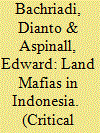

|
|
|
|
|
| Summary/Abstract |
In Indonesia, “land mafias” (mafia tanah) proliferate, alongside mafias that cluster around other commodities and state functions. We analyze the composition, character, modes, and sources of resilience of Indonesian land mafias, noting similarities with formations elsewhere, especially India. While taking care to avoid reifying the category, we view land mafias as opportunistic networks, or assemblages, of diverse actors including land brokers, investors, lawyers, gangsters, bureaucrats, law enforcement officers, and politicians. Their goal is to harvest rents from the transfer of ownership and control over land. They feature two elements: first, reliance on coercion (not always physical violence but always entailing transfer of property without freely-given consent, often via fraud or manipulation); second, institutional amorphousness crossing the state-society boundary. We analyze four modes of land mafia operation, though their nebulousness defies easy categorization. In explaining land mafia resilience, we acknowledge Indonesia’s property boom as a driver, but note that the ubiquity of mafias points to a more fundamental explanation: a variety of state formation involving pervasive engagement by state actors in illegal behavior in collusion with wealthy private actors. Mafias are central to Indonesian state formation, rather than aberrations. Feedback loops that incentivize illegal behavior make land mafias difficult to eradicate.
|
|
|
|
|
|
|
|
|
|
|
|
|
|
|
|
| 12 |
ID:
188846
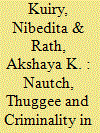

|
|
|
|
|
| Summary/Abstract |
Nineteenth-century colonial India witnessed the much-hyped anti-thuggee campaign, instrumental in creating an elaborate archive of frequent commentaries, opinions on banditry, prisoners and their trials, approvers’ accounts, administrative studies as well as fictional narratives. Re-reading such archival sources, this article explores how nautch, a hybrid form of dance, once glorified and later criminalised by the colonial powers, became a point of intersection between the Europeans in India and local thugs, who often benefitted from such dancers. The article shows the precarious position of the nautch performers as instrumental in collaborating with the colonial rulers and the outlawed thugs for controlling perceived ‘crime’ in the Indian subcontinent, while ending up as victims, too.
|
|
|
|
|
|
|
|
|
|
|
|
|
|
|
|
| 13 |
ID:
105907
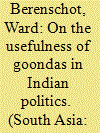

|
|
|
|
|
| Publication |
2011.
|
| Summary/Abstract |
This article discusses the cooperation between small-time criminals (or goondas) and politicians in a locality in Ahmedabad, Gujarat (India). Based on an ethnographic study of local political networks, this article argues that the regular co-operation between politicians and goondas is a product of the inaccessibility of the Indian state to its poorer citizens. The 'criminalisation of politics' is not a sign of moral decay, but a product of the difficulties of (poorer) citizens in dealing with state institutions and the specific nature of the local political competition that these difficulties engender. As local politicians need to develop their capacity to 'get things done' for voters, they need both the 'moneypower' and 'musclepower' of goondas to settle local issues, enforce their authority and manipulate voting.
|
|
|
|
|
|
|
|
|
|
|
|
|
|
|
|
| 14 |
ID:
107042
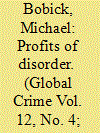

|
|
|
|
|
| Publication |
2011.
|
| Summary/Abstract |
This article looks at the multiple constructions that constitute the image of the Transnistrian Moldovan Republic (PMR), a separatist region located in eastern Moldova. The European Union (EU) and the international community construct the area as a 'black hole', a security and terrorist concern. The PMR has constructed the state's image on the basis of the memory of collective suffering at the hands of Moldovan oppression, in a fashion that resembles state building in nineteenth-century Europe. The best-selling author Nicolai Lilin invests a criminal Ruritania in his fake memoir of criminal tales and exploits. The article shows that a degree of order and legitimate means to make money exist in the PMR while it highlights a key and largely ignored element of the political economy of the PMR, namely the economic role and monopolistic practices of Sheriff and the strong interconnection between politics and economic activities.
|
|
|
|
|
|
|
|
|
|
|
|
|
|
|
|
| 15 |
ID:
181335


|
|
|
|
|
| Summary/Abstract |
This paper analyses allegations of aggression and criminality levelled against ambulant tourism entrepreneurs, such as tour guides and photographers, who work around the Taj Mahal in Agra, India, to understand how they experience neo-liberalisation in their everyday economic lives. I argue that these allegations function as technologies of neo-liberal governance through which non-state actors, like the media and tourists, engage in monitoring and regulating local entrepreneurs. Consequently, entrepreneurs experience neo-liberalisation in India in a paradoxical form: at once as a withdrawal of the Indian state from spaces it previously occupied and the simultaneous extension of governmentality, visible through increased public scrutiny.
|
|
|
|
|
|
|
|
|
|
|
|
|
|
|
|
| 16 |
ID:
139117
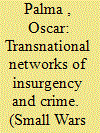

|
|
|
|
|
| Summary/Abstract |
The concept of commercial insurgency describes organisations permeated by criminal interests, especially when they participate in the production and trade of specific commodities. This article introduces a framework of analysis to explain how such organisations exploit elements through their region in order to embed militants beyond the borders of a single state. Through the construction of transnational networks, insurgents are able to perform political, military, and criminal activities, which not only contribute to the organisation's goal, but which also provide an opportunity for the insurgency to survive when the counterinsurgent offensive is strong within the primary theatre. This is a clear challenge for the state.
|
|
|
|
|
|
|
|
|
|
|
|
|
|
|
|
|
|
|
|
|